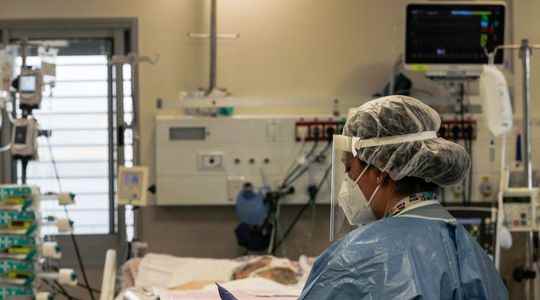Since Sunday, the green pass (or green pass), equivalent to the health pass in France, is no longer required in cafes, restaurants, bars, sports halls and hotels. But it remains strong in nightclubs, but also in event halls, conference venues, and non-seated cultural venues, such as concert halls. Relaxations in the continuity of those taken at the beginning of January, such as the end of travel restrictions.
And yet, Israel – like France and many other countries around the world – continues to suffer from Covid-19. The wave of contamination due to the Omicron variant, a strain of SARS-CoV-2 more contagious than its predecessors, has broken all records in the country. The peak seems to have been reached around January 25, with more than 100,000 contaminations on average over seven days, a figure 100 times higher than that a month earlier, during the Christmas period.
This situation logically has consequences for the hospital. As of February 7, the Jewish state had 3,282 patients in its healthcare establishments, a record, including 361 in intensive services (an unprecedented level for a year). The day before, using a slightly different method, the Ministry of Health estimated the number of so-called serious cases at 1,263. Finally, around fifty people are currently dying from Covid on average every day, the highest for many months.
Plus the champion of vaccination
The high level of contamination is a first explanation for this surge in the hospital, and this upsurge in deaths. Simple mathematical logic: a variant that is clearly more contagious always ends up being more dangerous. And it induces, with that, a slight bias: the number of patients admitted “with” Covid, and not “for”, is higher than usual, at “about 30% of hospitalized Covid patients”, according to Professor Cyrille Cohen, an immunologist at Bar-Ilan University, interviewed by The Parisian. These facts are common to the whole world, like France.
Another explanation for the Jewish state is found in vaccination. Israel, by immunizing its 9 million inhabitants very quickly, very strongly, a year ago, has long been considered a champion of vaccination. A title he no longer enjoys. The country is now stagnating at just over 72% of its population having received at least one dose of the vaccine. About 20 points less than in Portugal, well below Spain, Italy or even France. Some 7% of 60-69 year olds are not vaccinated, more than 5% of 70+.
Enough to leave a few gaping holes, against a variant that is certainly less dangerous than the Delta or the Alpha, but which is also more resistant to different injections. Thus, according to data from the Israeli Ministry of Health, the ratio is approximately 400 hospitalized patients per 100,000 inhabitants among non-vaccinated people over 60 years old (the most fragile) against 35 for those who have completed their vaccination cycle. within the same age group.
Setback?
On social networks, criticism also fuses against a country which was the first to operate a vaccine booster, in the summer of 2021. But it was a success which avoided a rebound in the fall. On the other hand, its effects were able to fade more quickly than elsewhere, in particular with Omicron. At the end of December, preliminary data collected by the British health agency (UK Health security agency) went in this direction. With Pfizer, protection against symptomatic forms fell from 70 to 50% after ten weeks. A deadline now largely exceeded for Israel. Which could explain, finally, the delicate situation of the hospital.
The country did try a fourth dose, in January, in a phase of exponential growth. This fourth dose has “tripled” the protection of those over 60 eligible for this injection, which more than half a million Israelis have benefited from so far. What made it possible to limit the breakage? May be. Israeli scientists remain skeptical: “The vaccine, which was very effective against the previous strains, is less effective against the Omicron strain”, declared, adamantly, Professor Gili Regev-Yochay, director of the disease epidemiology unit infections at Tel HaShomer Hospital (Tel-Aviv). Now, this fourth dose only reaches around 6,000 people a day.
